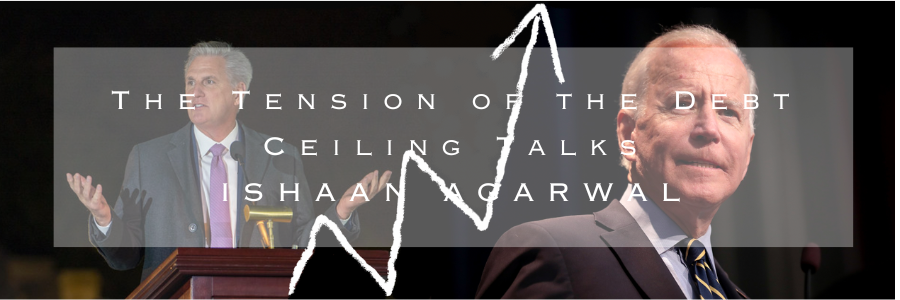My repository of thoughts on interesting ideas.
The Tension of the Debt Ceiling Talks

As the debt ceiling deadline of June 1 rapidly approaches, negotiators and policymakers representing the White House and GOP are embroiled in intense discussions to arrive at a compromise regarding spending priorities, fiscal obligations, and partisan strategies for the remainder of the decade.
Consequences of Failing to Raise the Ceiling
The debt ceiling is the legal restriction Congress imposes on the amount of outstanding debt the federal government may issue to finance its bills. The nation’s current borrowing limit is expected to be reached in a few weeks. Therefore, if the ceiling is not raised, the US Treasury may not issue additional debt, and the U.S. government will be required to rely on available cash to meet its financial obligations. In such a dark circumstance, the threat of default would be imminent resulting in the loss of investor and creditor confidence. The repercussions of this lost confidence will collapse the value of Treasury-issued debt, exacerbate the government’s credit rating, destabilize global markets, and increase the risk of a recession. For the average U.S. resident, these consequences may be seen in the short term in increasing borrowing and mortgage rates. However, given that the United States has never defaulted in its history, the exact effects on the economy cannot be determined.
Stances of the GOP and White House
Despite these extreme ramifications, both involved parties, the White House and Republican negotiators, are employing brinkmanship strategies in their endeavors to extract concessions from the opposing side. Democrats maintain opposition towards cuts in discretionary spending, while Republicans refuse to entertain new tax hikes. However, progress has been made as demonstrated by the offers tendered by Biden’s aides and numerous negotiations have occurred between Biden and House Speaker McCarthy. For better or worse, Republicans rebuffed any compromise thus far as being insufficient, especially on Friday when talks began to break down. GOP leaders stated they would not support any bill that, overall, funds the government and its activities at a higher level than this year, and instead argued for increased military, veteran, and border security spending and drastic, off-setting domestic spending reductions. Nevertheless, both parties have continued to use their respective leverage to elicit greater concessions from the other until a deal is struck, and it appears that the two may be close to arriving at an agreement this week.
Press Attacks and Alternative Strategies
Following the impasse over the past weeks, both the White House and GOP released sharp attacks of rhetoric targeting the other’s position on the issue. The White House accused Republicans of “working in bad faith”, “taking the economy hostage”, and “threatening the financial stability and credibility of the nation”. The Republicans fired back, blaming the White House for “moving backward” and wanting to increase the deficit. The increased tensions have some questioning whether a compromise can be reached in time. However, Democrats have a course of action outlined should the talks fail to produce a productive outcome or to avoid conceding certain reductions to Republicans, albeit one that is legally questionable. This line of action involves President Biden declaring the debt ceiling unconstitutional, pointing to the debt clause in the 14th Amendment, and then unilaterally calling for the repayment of federal debt. This action would not prevent questioning of the safety of US Treasury securities and threats to the nation’s economy as per former Treasury Secretary Jack Lew at a Council on Foreign Relations event in April. Furthermore, Philip Wallach, a senior fellow at the American Enterprise Institute, claimed it would provide the opportunity for the executive branch to abuse presidential power by circumventing Congress and its restrictions on debt and the federal budget. Therefore, using the 14th Amendment as a method to essentially abolish the debt ceiling may not be a short-term solution, especially if one anticipates the legal retaliation that may ensue.
Global Indications
In a broader holistic context, the standoff on the debt ceiling, when paired with the Fed’s struggle to corral inflation, a string of bank failures, increased geopolitical tensions with Russia due to the Ukraine conflict, and intense competition with China, is eroding U.S authority in the global market along with the dollar’s strength. The debt ceiling threatens the safety of U.S Treasury securities and, consequently, the status of the dollar as the world’s reserve currency as well. Similar to the ideas in Ray Dalio’s Principles for Dealing With a Changing World Order, these events warn of the decline of American prestige, and as Eswar Prasad, author of The Future of Money, remarks, the pillars that support the greenback are beginning to crack. Despite this concern circulating among scholars, economists, and business leaders, Wall Street does not correspondingly reflect the political turmoil. According to NPR, there has been some volatility in the bond market, the stock market has shown to be “relatively” stable. This indicates that Wall Street and investors are pretty optimistic regarding the resolution of negotiations and believe that the debt ceiling will be raised without default, even if it is in the final seconds of the eleventh hour.
Final Thoughts
The stakes of this standoff are high, and the clock is ticking. The outcomes and nature of these debt-ceiling talks have far-reaching implications that extend beyond U.S. borders. Despite tiptoeing dangerously close to the deadline outlined by Secretary of Treasury Janet Yellen, the GOP and White House may be close to working out a deal. However, it still remains to be seen whether such an agreement actually materializes soon and whether the two parties can work toward the financial well-being of the nation.




Hello beta
Wassup mi amor